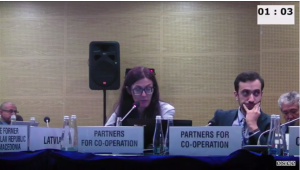HCA Vanadzor participated in HDIM 2017
16:42, September 20, 2017 | News, Own news Vardine Grigoryan, Democracy Monitoring and Reporting Coordinator at HCA Vanadzor participated in the Annual Human Dimension Implementation Meeting (HDIM) by the ODIHR in Warsaw where she presented remarks on the situation with freedom of assembly and space for human rights defenders, and the recent parliamentary elections.
Vardine Grigoryan, Democracy Monitoring and Reporting Coordinator at HCA Vanadzor participated in the Annual Human Dimension Implementation Meeting (HDIM) by the ODIHR in Warsaw where she presented remarks on the situation with freedom of assembly and space for human rights defenders, and the recent parliamentary elections.
Referring to the freedom of assembly and situation of HRDs she specifically stated (2:27:25 – 2:30:25) that within the last years, violations during assemblies became particularly violent with arrests and apprehensions multiplying disproportionately every year. The rhetoric of maintaining public order has been largely abused by the Armenian authorities at the expense of freedom of assembly: protesters, activists, and reporters were coercively apprehended and taken to police stations from the assembly venues arbitrarily and without any legal grounds. In 2014, 106 persons were apprehended in relevance to assemblies; in 2015 this number rose to 488 and in 2016 it rose to around 1000.
There have been several threats, attacks and criminal cases brought against advocates. There is also a new tendency of searches of defense attorneys in courts and prisons and arbitrary application of disciplinary sanctions against them.
The complaints and reports on police violations, submitted by human rights organisations and activists, are not properly investigated and prosecuted, while there is always harsh prosecution for any alleged act against law enforcement officers.
The purely political nature of the persecutions is illustrated in the case of one detainee, a former presidential candidate Andrias Ghukasyan was asked during the hearing for reconsidering his detention, whether he would continue his political activity after being released. His detention term was extended after his positive response.
Monitoring of assemblies revealed that police officers responsible for maintaining public order carried firearms during five assemblies in 2016. At least 20 officers carried fire arms during a march to the Embassy of the Russian Federation. It is obvious that there is a selective approach in controlling assemblies and the assemblies of political character and those perceived to be against Russian interests are treated more harshly.
The attacks against civil society are committed officially through false statement or defamation charges, as well as unofficially through Russia-funded organizations that claim to protect Armenian traditional and family values and can find a threat to it in anything vaguely anti-Russian or pro-European.
Following the remarks of the Armenian official Delegation on the assessment of the 2017 Parliamentary Elections in Armenia she stated (1:43:50 – 1:47:24) that in spite of the claims by the Armenian authorities, the OSCE/ODIHR observation mission report contains wealth of information on serious problems identified during the Parliamentary elections in Armenia.
The OSCE/ODIHR stated that the campaign was tainted by credible and widespread allegations of vote-buying, pressure on public servants including in schools and hospitals, and of intimidation of voters to vote for certain parties. This contributed to an overall lack of public confidence in the electoral process and raised concerns about voters’ ability to cast their votes free of fear of retribution, as required by OSCE commitments. The voting process was also marred with unlawful involvement of party proxies in the voting and tabulation processes. What ODIHR found credible, the Armenian authorities didn’t find important to investigate.
Domestic observers identified serious violations most of which were noted by ODIHR as well.
Among them
– The Republican party owns 3 times more in property and financial assets than all other parties combined. This initial advantage coupled with administrative leverages makes the party undefeatable.
– Public awareness raising efforts of the authorities were not sufficient, while the new code envisaged a full political change, the voter education materials addressed only the changes in the voting system and not the electoral and political consequences of the new system. The prepared materials were not disseminated properly either
– Vote-buying corrupted the entire electoral process. Representatives of the ruling party went as far as to argue that vote-buying is not a criminal but a philanthropic action.
– There were cases of violence during the election campaign period and the campaigns were built around local money tycoons and their authority rather than political platforms and policy
– Credible information on pressure and intimidation of employees of medical and educational institutions resulted in general decline of public trust in electoral process, the widespread administrative abuse was claimed to be natural and legitimate. All criminal investigations were dismissed
– Central electoral commission and law enforcement officials did not properly consider reports on electoral violations: the overwhelming majority of reports were deemed groundless and dismissed, while those investigated were eventually dropped as well. The efforts by the authorities were directed at silencing and concealing violations rather than investigating them. Specific cases were deemed “Isolated incidents which did not have an impact on elections, while allegations of widespread violations were deemed vague and false
– Electoral violations made it problematic for citizens to vote freely and without pressure. Cases of group voting, as well as attempts to influence voters and issues related to secrecy of voting were observed in the polling stations. The right to assisted voting was abused to control the voters and to basically vote instead of them.
– The Armenian authorities refused to invite international NGOs to observe the elections, arguing that there are enough local and intergovernmental observers. This contradicts the commitments to the OSCE.
HCA Vanadzor has recently updated its assessment of implementation of international recommendation on elections in light of recent elections. The Report can be found here.
